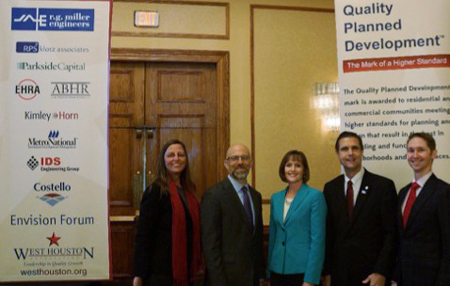| |
| Event Review: Technical Forum on the Envision Rating System |
|
 Tarrant Regional Water District (TRWD) supplies water to the Fort Worth area, much like the regional water authorities that supply water to most of Greater West Houston. TRWD is in the middle of constructing massive water infrastructure projects, which are similar to projects that Greater West Houston’s regional water authorities are undertaking in conjunction with the City of Houston. Tarrant Regional Water District (TRWD) supplies water to the Fort Worth area, much like the regional water authorities that supply water to most of Greater West Houston. TRWD is in the middle of constructing massive water infrastructure projects, which are similar to projects that Greater West Houston’s regional water authorities are undertaking in conjunction with the City of Houston.
“We originally looked at Envision because we needed a way to comply with SB 898. SB 898 requires public utilities in Texas to find energy reductions over time, and we couldn’t find any actual energy savings because demand is growing,” said Shelly Hattan, P.E. Ms. Hattan is TRWD’s Project Manager for Line 1 Section J, the project that received a Gold Envision Rating.
“So Envision gave us away to quantify our energy savings and comply with the statute,” said Hattan.
 Rachel Ickert, TRWD’s Water Resource Director, added that, “We found a lot of other benefits to using Envision. We built a framework for stakeholder outreach, life cycle cost analysis, and sustainability that we are replicating on other projects, which will save us time and money. The District will spend about $366,000 on Envision for its $2.4B Integrated Pipeline Project. As an organization, TRWD is committed to sustainability and the Envision process as a way to get there." Rachel Ickert, TRWD’s Water Resource Director, added that, “We found a lot of other benefits to using Envision. We built a framework for stakeholder outreach, life cycle cost analysis, and sustainability that we are replicating on other projects, which will save us time and money. The District will spend about $366,000 on Envision for its $2.4B Integrated Pipeline Project. As an organization, TRWD is committed to sustainability and the Envision process as a way to get there."
This was not the West Houston Association’s first Envision Technical Forum, but it was the first time the speakers could talk about how Envision worked from the owner’s perspective.
Michael Bloom, P.E. of R.G. Miller and an Envision Sustainability Professional (ENV SP), explained the history and methodology behind Envision, which applies to infrastructure like LEED applies to buildings.
Envision is a product of the Institute for Sustainable Infrastructure, a collaboration between ASCE, ACEC, APWA, and Harvard’s Graduate School of Design. Owners of infrastructure projects may apply for 60 different credits in 5 different categories. The five categories are (1) Quality of Life; (2) Leadership; (3) Resource Allocation; (4) Natural World; and (5) Climate Risk.
“I’ve heard that LEED certification is really big in Houston. The Tarrant Regional Water District obtained a LEED Certification on one of its buildings recently, and we found Envision to be much easier and more cost effective than LEED and more relevant to what we do on major infrastructure,” said Ickert.
Hattan, Ickert, and Bloom walked the audience through examples of how TRWD applied for and obtained credits for each category. Representatives from North, Central, and West Harris County Regional Water Authorities, Coastal Water Authority, and the Region H Water Planning Group were in an audience of 52 developers, officials, engineers, lawyers, and consultants. Many audience members had questions about the in-situ fill process TRWD used that received points in both the resource allocation and natural world categories.
“Envision has been out there and people have been talking about it for a few years, but we didn’t have any real examples to follow,” said Marlene Gafrick, Director of Planning at MetroNational.
“Taking a live project and showing how Envision works in practice was very helpful,” said Gafrick. “This was a good introduction, and I would like to see more case studies and know how things like low impact development figure in.”
Bob Jones, President of Jones Engineering Solutions said, “Most of the major residential developers incorporate many sustainable practices already. These developers could probably achieve high ratings if they were willing to invest the time and money in the process. The question is whether this sort of designation is worth the investment.”
Peter Houghton, Vice President of Howard Hughes—Bridgeland and Chairman of the North Fort Bend Water Authority said, “I’m glad I came. The forum underscored the West Houston Association’s ongoing goal of improving sustainability practices in a meaningful way in Greater West Houston. We’ll look into Envision to get some ideas on how to improve various parts of our practices, even if we don’t apply for formal credit. But given the challenges of development, getting formal recognition (through LEED or Envision) for good work has value. We’re interested.”
The forum was the result of work by the West Houston Association’s Sustainable Infrastructure Committee. Jim Russ, the chair of the committee, also told the audience that the committee was working with the Quality Planned Development Committee on incorporating a sustainability component into the QPD designation.
For more information on the event, Envision, our sponsors, and other details please visit the event page. |
|
|
|
|
|
| |
|
|